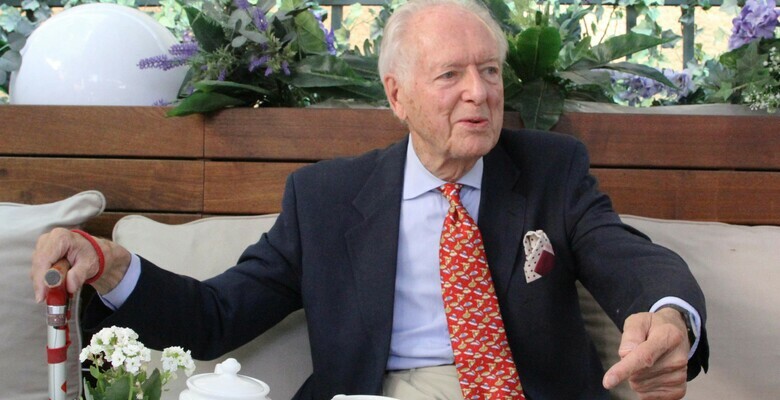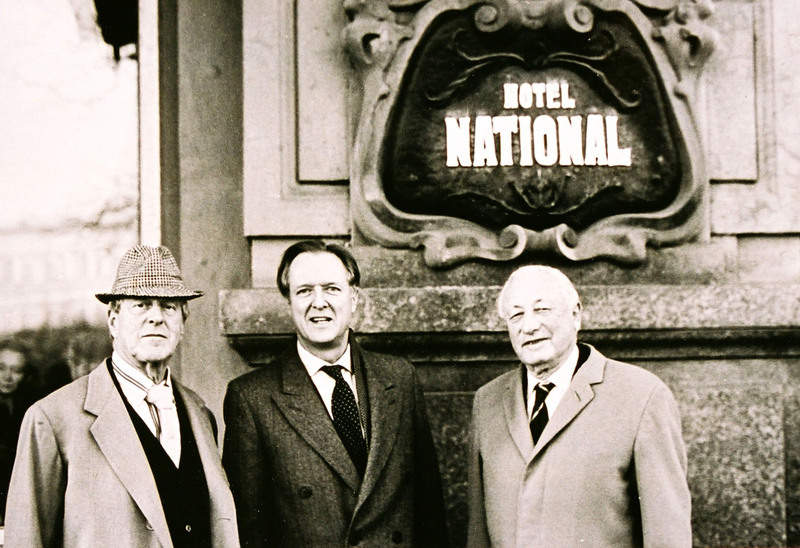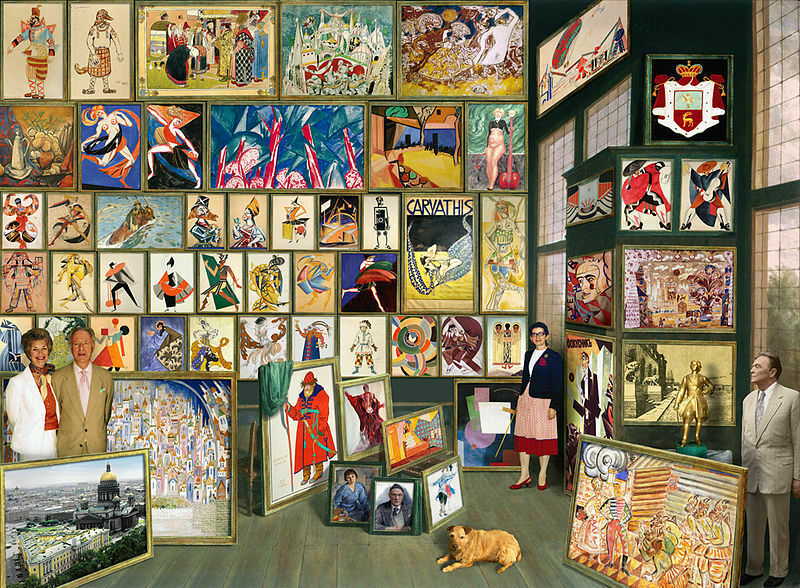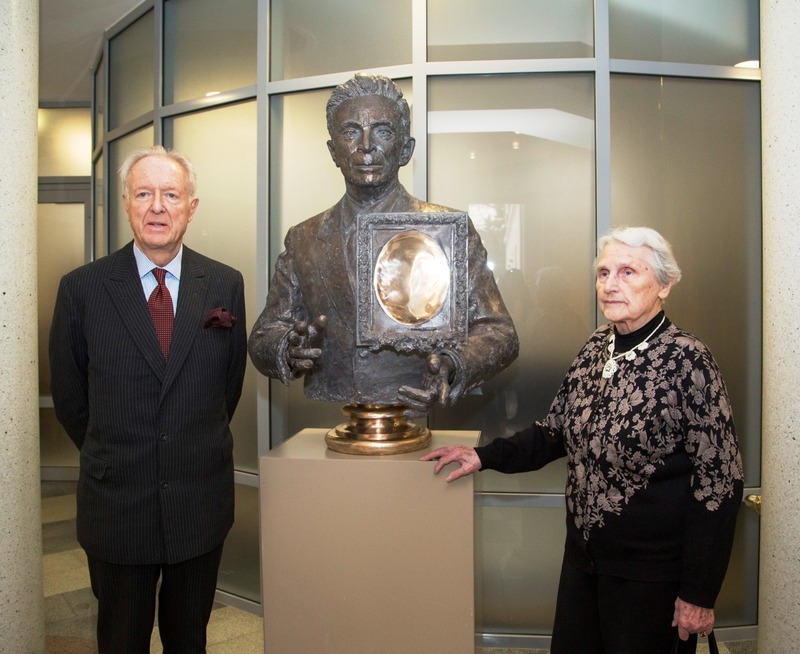
 The long life of the 87-year-old Prince Nikita Lobanova-Rostovsky is similar to the plot of a thriller, or, indeed, as some may say, a spy novel. This descendant of Ivan the Terrible is a man of many hats. As an heir to the Rurik dynasty, can, rather amusingly, be called a ‘Rurikid’. His ancestors ruled in Rostov Veliky for centuries. An Oxford graduate, he is a geologist who discovered diamond mines in the Kalahari, a successful banker who cut multimillion-dollar deals in the saloons of gentlemen’s clubs and an outstanding collector and donor of Russian stage art, and for this at least he will certainly go down in history. Nikita Dmitrievich has seen many different countries. In recent years, he has been living happily with his wife, an English aristocrat named June, in the London borough of Cheswick. The head editor of Kommersant UK, Ksenia Dyakova-Tinoco, asked the Prince about the dramatic situation in British politics, the climate crisis, collecting and his personal route to happiness. Keep on reading until you get to the end and you won’t regret it!
The long life of the 87-year-old Prince Nikita Lobanova-Rostovsky is similar to the plot of a thriller, or, indeed, as some may say, a spy novel. This descendant of Ivan the Terrible is a man of many hats. As an heir to the Rurik dynasty, can, rather amusingly, be called a ‘Rurikid’. His ancestors ruled in Rostov Veliky for centuries. An Oxford graduate, he is a geologist who discovered diamond mines in the Kalahari, a successful banker who cut multimillion-dollar deals in the saloons of gentlemen’s clubs and an outstanding collector and donor of Russian stage art, and for this at least he will certainly go down in history. Nikita Dmitrievich has seen many different countries. In recent years, he has been living happily with his wife, an English aristocrat named June, in the London borough of Cheswick. The head editor of Kommersant UK, Ksenia Dyakova-Tinoco, asked the Prince about the dramatic situation in British politics, the climate crisis, collecting and his personal route to happiness. Keep on reading until you get to the end and you won’t regret it!

Nikita Dmitrievich, was it difficult for you at a young age as a refugee and emigré in a foreign land? What helped you to keep on developing and improving yourself, even at a mature age?
The motivation to strive higher and higher arose in me in early childhood. I was born in Bulgaria, where my family had moved to in 1921. I can remember that when I was six, I was interested in absolutely everything and I tried to soak in as much new information as I could. My parents helped me with this, as they instilled in me a love of opera and ballet at the age of five. I was very lucky to be among like-minded people at school. The poet Lyubomir Levchev, the palaeontologist Platon Chumachenko, the mineralogist Svyatoslav Petrushenko and the opera singer Dancho Peev; we all studied together and we never skipped a lesson. We even stayed on with the teachers after classes had ended to continue conversations about interesting topics. We all finished school with distinction.

When I got out of prison in Sofia, where I had spent a year after my family had attempted to cross the Greek border, a doctor warned me that if I didn’t take up sport seriously I’d end up rickety all my life. This scared me so much that I sorted myself out and became a Bulgarian youth swimming champion.
At Oxford, where I arrived in 1954 after a year of life in Paris, I kept on doing sport seriously. Talking to Russian-speaking teachers helped me to keep focused on my studies and keep entertainment to a minimum, although this wasn’t easy. There were figures such as Sir Isaiah Berlin, Dimitri Obolensky, the specialist in Byzantine history, the philologist Unbegaun and other outstanding people. In 1958, in New York, where I was studying at Columbia University, I befriended a geology professor called Charles Berry, after which I also began to focus on science. Thanks to my health, energy, and of course, my willpower, I was able to work harder than my colleagues. Without motivation, sport and love of hard work, I would not have achieved what I had dreamt of; I would not have been able to establish myself in the capitalist world, assemble a unique collection of theatrical paintings and be happy in my marriage. I have lived for the past twenty years in perfect spiritual and physical harmony with my wife June. I feel that I am lucky and privileged.

In one of your interviews, you said that you consider London one of the best cities in the world. Why is this?
Some people live in France because they love French 18th-century literature, they respect the culture of the country and they like to live in an imperial city with wonderful architecture. Others like to live in Saint Petersburg for similar reasons. For me, London combines and holds all the possibilities that interest me in life, although I have lived in many countries in the world. There is a first-class opera, marvellous ballet and dozens of theatres. There are more here than in New York. What’s more, all kinds of interesting people live here. People who are considered eccentrics come here from all over the world to appreciate the independent lifestyle. They’re accepted in England as there are many unusual personalities among the English themselves. And what is most important of all is that in England there still exists a form of democracy in which you can take the government to court and the government itself will provide you with funding and a lawyer if you are on a low income. I feel more legally protected here than in any other place in the world. I was born in Bulgaria. I am a Bulgaria citizen, but Bulgaria is the most corrupt country in the European Union, things there are absolutely lawless… that’s why I don’t live there; I’m an ex-convict so, psychologically, it’s very important for me to feel safe.
This year Queen Elizabeth II celebrated the platinum jubilee of her reign. How do you see the future of the British Royal Family after the innumerable scandals of the last few years?
I’d like to qualify this as just my opinion, as people can very rarely predict anything, but this is based on historical precedent. Each monarch costs its government a tremendous amount of money. For example, 65 years ago, with the ascension of King Constantine II to the throne, the upkeep of the Greek monarchy cost something in the order of 500 thousand dollars a year. Despite the Greek monarch’s commendable achievements as a champion Olympic sailor, the lefties were always going on strike, complaining that that half million could have been spent on something more useful. Constantine was forced to leave the throne. In England we are experiencing a similar, unfortunate time of dogmatism; those on the left are always going on about the great expense of maintaining the royal household, as not only the monarch herself receives these subsidies, but also close members of her family, unlike the Danish, Swedish or Norwegian royal households. This is why it seems to me that as soon as Prince Charles ascends to the throne, there should be some dramatic changes. After all, nothing has changed for too long. I hope that only working members of the family will receive subsidies, most likely, there will be four of them. After all, we read in the papers every day about the number of functions they participate in; it’s a never-ending, full-time job requiring constant vigilance, they have to play the role of actors all the time. The rest of the Royal Family can look after themselves. They are wealthy. What will it mean? They may have to reduce their expenditure to fit their incomes. Some of them will have to change their lifestyles.
Will the Royal Family be reconciled with the Duke and Duchess of Sussex, Harry and Megan?
That will be difficult to do as Harry has behaved very disrespectfully. I understand that it has been very hard for him since his childhood as, first of all, he is illegitimate and seemingly a copy of his father (for many years there have been rumours that Harry’s father is the redheaded cavalry officer Jame Hewitt who was Diana’s riding instructor- ed). Secondly, he has found himself a very experienced woman intimately speaking, and what’s more, Megan is a good actress and very clever. The fact that she clearly is able to support him psychologically will ultimately destroy Harry; over time he will become completely dependent on her. He has already spoiled his relations with his family because of her by making many inappropriate statements.
Could you draw a parallel with Wallis Simpson?
Wallis Simpson was also very sophisticated sexually speaking.
Let’s look at some other issues. You continue to donate fantastic exhibits to Russian museums. Aren’t you sorry to part with them?
No. Right now I’m having 25 suitcases packed with gifts for the Rostov museum. We haven’t got space to keep them at home, so they’re in the yard behind the barn, where they’re waiting to be sent to the Russian embassy, from where they’ll be sent to Russian and on to the Rostov museum by coach.
Do the recent anti-Russian sanctions and talk of the cancelling of Russian culture bother you?
I’m indifferent. In Rostov, our family ruled for centuries. Everything changes over time, but the Rostov museum and the city itself aren’t going anywhere. I started to donate works of art in 1970 when Leonid Brezhnev was in power, and I’ve never stopped, not during Communist rule, not during so-called democratic times and not now, during the current regime either. Politics does not affect what I do.
In a recent interview, Elena Sudakova, the director of Pushkin House said that ‘the time has come to forget the term “Great Russian Culture”’. If this is the case, what, in your view, will come to replace this concept?
It seems to me that I understand why Elena Sudakova calls for this concept to be forgotten. She heads a public organisation which is visited by Britons and Russians. In the prevailing conditions in Britain, where political correctness dominates, the enormous achievements of many years of Russian culture are being denied and underplayed. They are being actively rejected by students and left-wing intellectuals. On top of that, most of the population of the country have negative perceptions of Russia. This means that the phrase ‘Great Russian’ could irritate many of Pushkin House’s visitors. Of course, I don’t agree with this as I can’t deny the greatness of Russian culture. However, this is only possible because no one pays my salary, I am wealthy and I depend on no one. I am completely indifferent to the current views of the majority.

What principles were guiding you when you began collecting 20th-century Russian art? Did you appreciate the future financial value of works that were little-known at the time, or did you just love the art?
I did it for the love of the artwork, but I have always been a collector. When I was five or six, I began to collect postal stamps and then coins. When I was about ten or twelve, I threw myself into mineral collecting. So the makings of a collector have been in me since childhood. I was a geologist and ignorant of art when I went to the exhibition of Russian stage design artists in London in 1954, so it was quite a shock for me. It was then that I decided to collect paintings.
Do you mean a shock in a good way? Like falling in love?
I had a visual shock. The simple, bright, lubok-like quality of Russian stage design art and its dynamism entranced me… (Luboks are a style of popular Russian prints- translator’s note)...I’m visual, I like to look. At you, for example. Our garden is full of flowers, and each day, sitting here, smoking a cigarette or sipping tea, is a visual pleasure.
Which of the famous people you have met in your life struck you most of all and left the greatest impression?
There were very many of them, I’ll name two or three names. In the sphere of business, Lord Peter Carrington comes to mind, the former foreign secretary in Margaret Thatcher’s cabinet, who subsequently was the head of the Christie’s auctioning house. At the time, I was an advisor to Christie’s board on Russian matters and we often met. He usually gave ten minutes of his time to our meetings; five minutes to present the issue, three minutes for a response and two minutes to sum up. Then he always took a decision; either yes or no. This condensed approach had a very strong impression on me, as I had spent the previous twenty years conducting business meetings in America and Europe, which usually lasted much longer, which was a great waste of time.
I mustn’t leave out Alfred Barr, the founder and, for many years, the director of the Museum of Modern Art in New York. I had been a collector of Russian stage design art since the 1950s, and nobody was interested in it from either an intellectual or a commercial perspective, so the support of a world-famous art historian was very important for me. Barr had already visited the USSR back in 1923 when he visited the studios of all the outstanding artists of that time. He returned to New York, bringing their works with him, and he was the first art historian to include the achievements of Russian modernism in his book on contemporary painting. He shared a house in Manhattan and became friends for many years. His wife, Margo, was a teacher on an art course that my wife, Nina attended. He visited me and my wife and I introduced him to our acquisitions. Barr was the first to recognise the significance of Russian non-objective painting in twentieth-century European culture.

A huge role in the development of my collection was played by my acquaintance with professor Ilya Samoilovich Zilberstein, who for many years was the editor of the journal Literary Heritage. We met when Zilberstein was on a business trip in Paris in 1967. He came to see us at our flat on the Avenue d'Iéna where we kept our collection of work from the Mir Izkusstva art movement. Zilberstein’s approval as a prominent Soviet scientist, a passionate collector and a connoisseur of the period confirmed to me that our collection was significant for Russia. His support subsequently served as an impetus for further collecting and eventually for the opening of a museum of private collections in Moscow. Professor John Bowlt supported us, explained things and helped us to systemise our collection.
Meetings with renowned artists were unbelievably interesting and enlightening. I met Yury Annenkov, Marc Chagall, the art historian Sergei Ernst, Salvador Dali, the Benois family, Mstislav Dobuzhinsky, Romain Tirtoff (Erté) and many others. Now our collection of stage design art, made up of 940 exhibits, is owned by Shalyapin House, where it is kept. This is a branch of the Saint Petersburg Theatrical Museum.

Let’s leave the world of the arts and get back to pressing problems. Many better-off Britons who have the space to accommodate people are inviting Ukrainian refugees into their houses. Naturally; sometimes there are disagreements between guests and hosts. As you were once an emigrant yourself, maybe you could give some advice?
It’s difficult for me to answer this question. I can only share my overall opinion based on my experience of living with a British lady. Unfortunately, after a certain time, love and sexual attraction become secondary and domestic issues come to the fore. Issues such as how you fold your clothes, how you organise your room, how you talk and how you smell. Behaviour, upbringing and rituals in England are very different from the customs in other countries, especially in high society. I very clearly understand why these clashes occur, whatever may be the station in life and culture of the emigrant. What’s more, refugees have suffered, they expect constant support, they are demanding and frequently their demands are difficult for those who are hosting them to understand. This means conflict is inevitable.

Is there anything they can do about this?
There’s not much you can do about it. It would be simpler to give refugees money and house them in hostels so they could sort things out for themselves. Instinctive adaptation is much easier between a man and a woman when there is attraction. That brings people together, despite there being differences in lifestyles.
Why are so many Russian businessmen who come to Britain unable to integrate, ending up out of work?
That’s a completely different story. They are out of work because they can’t fit in. We have a whole series of acquaintances who are the heads of leading Russian companies, but their psychological makeup is completely different to people here. Their manner of behaving is unacceptable in England for various reasons. They are very nice people, but they have been brought up in the Russian way. If Russian businessmen meet with business people from other countries, their behaviour and way of dressing really stands out. Russians also talk a lot about themselves and their achievements. However, for an Englishman, even if he is a prime minister and is dining with a friend, this just won’t do, he won’t boast.
Wouldn’t you say that Americans are like that?
This is why the English look down on the Americans. The first thing that an American asks upon being introduced is ‘How much are you making?’. This is a very indecent question in England. There are a great many details that come up when socialising and in domestic life, and it’s very hard to keep track of them all and take them into account.
On the subject of recent news, this summer a scandal over partygate, which actually started quite a while ago, brought about the resignation of Boris Johnson. He has now been required to go and the contest between the candidates to replace him at the head of the government is ongoing. Why did this crisis in party ethics arise? Why do politicians allow themselves to behave in ways which were previously unthinkable? Or is the problem not the politicians, but simply that these things did not become public in the past? What do you think of the still current prime minister?
Johnson is doubtlessly a very gifted person. He’s fun, he’s photogenic, and people like him. He became the most popular politician in England while he was still mayor. What’s more, the deadbeats, that’s to say the lefties, find it hard to get at him, because genetically he is Russian, Jewish and a Turk. At the same time, you can’t say that he’s from a privileged background, he’s not a member of the English aristocracy. Unfortunately, Boris was so fixated on himself and his desire to affirm himself in the role of prime minister of the country that he has surrounded himself with second rate people and, as a populist, with people from ethnic minorities and women, who were completely inadequate for their roles. And overall, he is amoral; if it’s necessary to fib to achieve something, Johnson will lie.
It’s possible that Johnson’s fall has heightened suspicions that the Russian Federation helped him to become prime minister. That meeting without witnesses with Lebedev is unprecedented for the prime minister of any country. As is the fact that he made the son of a former Chekist a lord, despite warnings from the British intelligence service not to do so. This is utterly incompatible with the morals that a British leader should have, as are other things he has done. People know that Lebedev was the KGB resident in London. The press does not demand that the House of Commons pursue Johnson for this. Party gate is nothing in the scale of both global and local problems, but it is a very convenient pretext to get the attention of the press…
What should we expect to come, who will end up leading the country in September?
I am afraid that, as usually happens, they’ll choose the one the MPs find most fitting, rather than the best. The tragedy is that the current leadership contest is not a general election but rather, is intended for a small circle of Tory deputies who are all trying to get a place in the cabinet of the future prime minister. At the moment, the Indian candidate looks to be the best choice. However, the foreign secretary Truss will probably win since she’s promised to cut taxes and fund it with increased borrowing. This will worsen the state of the country still further, but those who get to vote in this contest are indifferent. What matters to them is for taxes to be cut tomorrow. They can’t grasp that high inflation is coming tomorrow and that Labour will replace them in power. By the way, did you notice how few of the candidates were white this time? Only two of the seven. This demonstrates at what stage of its historical development England now finds itself.
As you know, less than half of English people vote in elections, which is why in England the government always only represents a minority rather than the population as a whole, in contrast with Switzerland, where people are obliged to vote and fined if they don’t. Here, most of the bourgeoisie and the aristocracy are not interested in politics, they consider it a dirty business.
Aren’t the people of Britain afraid that everything will be decided without them? Or, on the contrary, that important decisions won’t be taken at all?
We are heading towards the inevitable death of our planet. Why are we not acting about the climate? Even if the English give this matter their attention, China and all of Africa have other priorities. For politicians it’s important to be able to succeed and survive today, not in ten years, when they won’t be there any more. Yesterday June told me that if we had children we would have had to move to New Zealand, as at least from the perspective of the climate, it will be possible to survive there and even a nuclear conflict would be likely to affect that country only minimally. Humanity really is very close to catastrophe. This is the key question now, but countries cannot agree because they are too different in terms of their relative stages of development. Politicians on the whole very rarely worry about their countries, except perhaps for the Chinese. Despite everything, they have helped their country achieve considerable prosperity. I remember that forty or fifty years ago, when I was in China, there were 200 million people there going hungry, and they were going about on foot and boiling grass in tin cans. I have observed this phenomenal success with my own eyes. It is difficult for the Chinese to cope with ecological problems because they don’t have enough oil. Instead they have a huge quantity of cheap coal for their power stations, as Turkey has. Now the Chinese and the Turks are lucky, as they have started to buy Russian oil at a discount. I hope that agreements between the Saudis and Western countries will lead to a moderate fall in oil prices, let’s say to $60 a barrel. If China can buy oil from Russia for $40 (with a discount), then it will be able to forget about its environmentally harmful lignite, and we’ll be in with some kind of chance.






